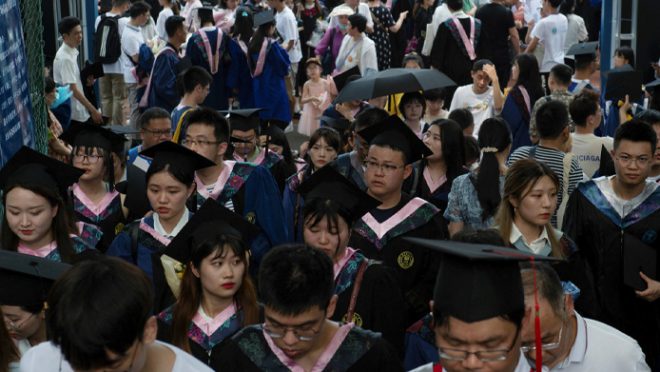Highly educated young people in China are choosing professions as drivers, labourers, and extra artists in films
Highly educated young people in China are choosing professions as drivers, labourers, and extra artists in films

China has become a place where a technician in a secondary school might hold a master’s degree in physics, a cleaner could be skilled in environmental planning, a delivery person might be a philosophy graduate, and a PhD from the prestigious Tsinghua University has joined the police force as an assistant officer.
These scenarios have become common in China due to the economic downturn.

Photo: BBC
San Zhan, a 25-year-old who recently completed his master’s in finance, is preparing to work as a waiter in a hotpot restaurant in Nanjing. “My dream job was in investment banking,” he says, but he has been frustrated in his search for a high-paying job.
Every year, hundreds of thousands of university graduates emerge from China, but there are not enough jobs for them in many cases. China’s economy has stagnated, particularly in the real estate and manufacturing sectors.
The youth unemployment rate was once close to 20%. Although the statistics were tweaked to present a better picture, the rate in August 2024 was 18.8%. Recent data from November shows it has slightly decreased to 16.1%.
Many graduates are forced to take lower-skilled jobs because they cannot find work in their chosen fields, and they face criticism from family and society.
San Zhan’s parents are unhappy with his choice to work as a waiter. “My family’s opinion is a big concern for me,” he says. “I studied for many years and went to a good university.” His family is ashamed of his profession. They want him to try for a government job or become an official. But his straightforward response is, “This is my decision.”
However, he has a secret plan. While working as a waiter, he will learn the ins and outs of the restaurant business. He intends to open his restaurant in the future. He believes that one day when he becomes a successful businessman, his family’s criticism will change.

Photo: BBC
Zhang Jun, a professor at the City University of Hong Kong, says, “The job situation in China is complicated. Many young people are having to rethink their aspirations.” He explains that students are pursuing higher degrees, hoping for better opportunities, but reality is disappointing them.
Wu Dan, a 29-year-old currently training at a sports injury massage clinic in Shanghai, says, “This is the first job search for many of my master’s classmates. Very few have been successful.”
But Wu Dan was not supposed to be in this situation either. He graduated from the Hong Kong University of Science and Technology with a degree in Finance and worked for a futures trading company in Shanghai. After studying in Hong Kong, he wanted to return to the mainland and work in a private equity firm. He received some offers but was not satisfied with the conditions.
As a result, his family did not approve of his decision to start training in sports medicine. According to his family, his previous job was good, and he was overqualified. They did not understand why he chose a lower-paying, physically demanding job.
Wu Dan admits that he cannot survive on his current salary in Shanghai without the benefit of living in his partner’s home.
Initially, no one supported his career change. However, recently, his mother, who had been suffering from back pain for a long time, has become supportive after Wu Dan’s treatment reduced her pain. Now, Wu Dan believes that working in the investment world is unsuitable. He says he is interested in sports injuries, enjoys the work, and wants to open his clinic someday.
Professor Zhang says that Chinese graduates are now forced to change their job perceptions. He mentions that many Chinese companies, especially technology companies, have laid off many employees. This could be “a warning sign” for young people.
In many cases, companies that were previously major recruiters of graduates are now offering jobs with substandard conditions. Good opportunities are disappearing. Many unemployed graduates are looking for work in the film and television industry until they figure out a plan.

Photo: Collected
Big-budget films require many extras. Many young people seek acting work in Hengdian, a famous film city southwest of Shanghai.
Wu Jinghai, 26, who studied electronic information engineering, says, “I usually stand next to the hero or main character. I am seen, but I have no dialogue.” He worked as a bodyguard in a play and joked that his good looks helped him get the job.
Wu Jinghai says that many people work in Hengdian for a few months. He also sees it as a temporary solution until he finds something permanent. “I don’t earn much, but I am comfortable and free,” he says.
Li, who initially did not want to reveal his name, says, “This is the situation in China. Graduating and then becoming unemployed.”
Li studied film directing and screenwriting. He has signed up to work as a movie extra for a few months. He says, “I came here to look for work while I was young. When I get older, I will find a permanent job.”
However, many fear that they may never find good jobs again and will have to adapt to professions outside their imagination.
Due to a lack of confidence in China’s economic progress, young people often do not know what the future holds.
Wu Dan says that even his employed friends feel lost. “They are quite confused and uncertain about the future,” he says. “Those who have jobs are also not satisfied with them. They don’t know how long they can keep these jobs and what they can do if they lose them.”
He says that he will adapt to the situation and gradually figure out what he wants to do.


